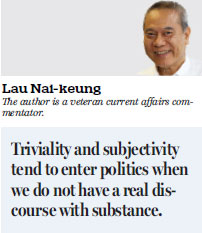Remembering the issue of income inequality
Updated: 2017-03-14 07:17
By Lau Nai-keung(HK Edition)
|
|||||||
'Back in 2014 BT (Before Trump), the headlines were all about income inequality. I don't recall hearing much of anything about immigration in the news. Then candidate Trump - the Master Persuader - told us that immigration was a big problem. Almost instantly the media started treating it like the biggest issue in the world," Scott Adams noted in his blog.
Did Trump win because he picked policies that people liked? Well, not exactly. What happened is that Trump persuaded us that immigration was a big problem.
As I have pointed out here many times, what happened in US politics is a manifestation of a large global pattern. In fact, the US is arguably the last to be infected by its own poison. Hong Kong, at the forefront of the "New Cold War", has been exposed to the worst political weapon of mass destruction for a long time.
Localists in our city have also successfully pushed the issue of income inequality off the stage. A few years ago, our dissidents fussed about income inequality and social immobility. These were admittedly important issues, and they still are, but the dissidents seem to have lost interest. Today, our city's biggest problem has suddenly become immigration - in the form of mainlanders infiltrating all aspects of our society.
But is inequality really gone? Is it no longer important?

For better or for worse, when Leung Chun-ying ran for Chief Executive five years ago, he brought with him some noble ideas. Back then, his supporters felt they were supporting someone with a cause - a feeling that is lacking in the current election.
After he completed his only term, Leung can at least be proud that groundbreaking achievements have been made in poverty alleviation and other social welfare policies that he has prioritized. These include bold measures such as the Old Age Living Allowance and the Low-income Working Family Allowance, which were both introduced under his current administration.
Leung's administration broke ground by establishing the first ever official poverty line in Hong Kong. The line provided the public with an insight into the level of poverty within society and the effects of the government's poverty alleviation policies. According to the Commission on Poverty, 373,500 people were lifted out of poverty in 2015 after considerable resources were put into alleviating poverty during the current term of government. That is impressive. But also according to the commission, just under 1 million people still live below the poverty line.
In the current election, we get a feeling that the major candidates are more or less the same. They are all born and raised in red tape - even the judiciary is one big bureaucracy - but we are led to believe that one of them is somehow cooler than the other. The reality is that these candidates basically share the same worldview.
I repeat, who is a better Chief Executive is purely subjective at the public relations level. For example, John Tsang Chun-wah's laid-back style is "the worst thing" for Hong Kong. But of course others like Tsang precisely because of this style.
Is the Chief Executive race simply a matter of style? Was it the reason why the welfare sector in the Election Committee did not give Lam any nominations even though social welfare was Lam's strong point throughout her public service experience?
By the same token, Regina Ip Lau Suk-yee must be unfit for office because she once dared to wear a bushy "broomhead" hairstyle.
I am not really joking here. Donald Trump makes a lot of polarizing statements. Yet for a lot of US voters, the matter of the Republican presidential candidate's hair remains the biggest subject of debate.
Triviality and subjectivity tend to enter politics when we do not have a real discourse with substance. When Leung Chun-ying ran for Chief Executive, he gave us a vision and promised change. He was both loved and hated for exactly the same reason. Today, we have a strong feeling that this short era of hope is gone. In the name of social harmony, Leung was criticized as heavy-handed and Hong Kong is again moving toward further conservatism.
Harmony is hardly a vision, especially when the underlying injustice is not addressed. Without vision, we have no hope; and without hope, Hong Kong is doomed. How can a doomed city enjoy harmony? With style?
(HK Edition 03/14/2017 page9)